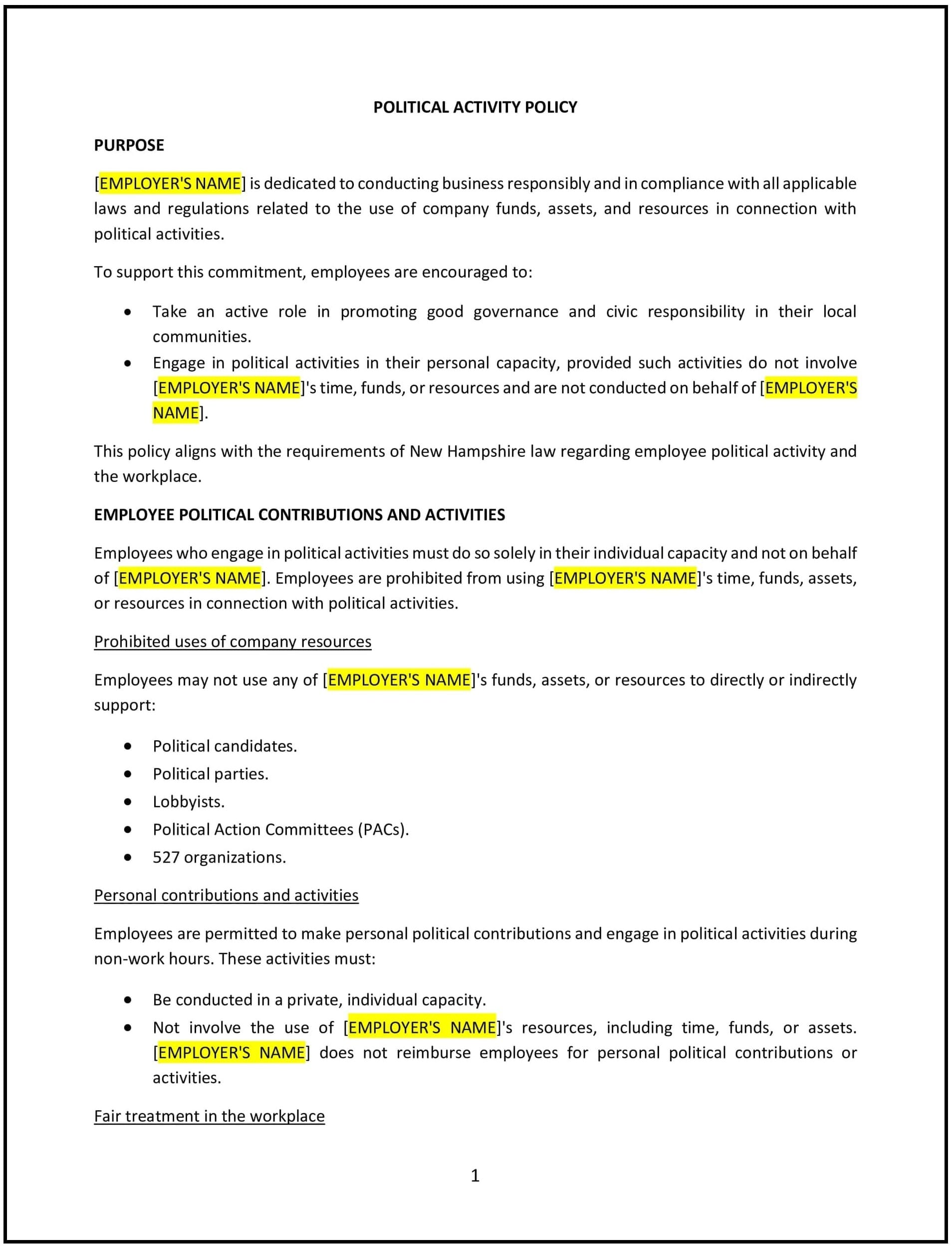Political activity policy (New Hampshire): Free template
Got contracts to review? While you're here for policies, let Cobrief make contract review effortless—start your free review now.

Customize this template for free
Political activity policy (New Hampshire)
A political activity policy helps New Hampshire businesses define the guidelines for employees’ involvement in political activities while ensuring that such activities do not interfere with their work responsibilities or the company’s operations. This policy outlines the boundaries for political participation during work hours, the use of company resources, and any actions that could be perceived as conflicts of interest.
By adopting this policy, businesses can promote a respectful and balanced work environment while safeguarding the company’s reputation and interests.
How to use this political activity policy (New Hampshire)
- Define acceptable political activities: Specify what types of political activities employees can engage in, including volunteering, donating, campaigning, or participating in political discussions, both on and off company premises.
- Address company resources: Clearly state that company resources (e.g., email, office supplies, or work time) should not be used for political campaigning or related activities unless permitted by the business.
- Set boundaries for political expression: Define the limits for political discussions during work hours or on company premises, ensuring that such activities do not disrupt the workplace or create conflicts among employees.
- Prohibit conflicts of interest: Ensure that employees do not engage in political activities that could create a real or perceived conflict of interest with their job duties or the company’s business relationships.
- Encourage transparency: Encourage employees to disclose any political activities or affiliations that could potentially affect their professional responsibilities or the company’s reputation.
- Outline disciplinary action: Specify the consequences for employees who violate the policy, such as using company resources for political purposes or engaging in disruptive political activities.
- Review and update: Regularly review and update the policy to ensure it aligns with changes in political activity laws, business operations, or organizational goals.
Benefits of using this political activity policy (New Hampshire)
This policy offers several benefits for New Hampshire businesses:
- Promotes workplace neutrality: A clear political activity policy helps maintain a neutral and inclusive work environment by preventing political activities from interfering with business operations and workplace relationships.
- Safeguards company resources: By establishing clear rules about the use of company resources for political activities, businesses can avoid misuse of assets and potential legal issues.
- Reduces conflicts of interest: The policy helps ensure that employees' political activities do not create conflicts of interest or affect their professional responsibilities, thereby protecting the company’s reputation.
- Protects productivity: By limiting political activities during work hours, businesses can minimize distractions and maintain focus on work tasks, improving overall productivity.
- Supports compliance: The policy helps businesses stay compliant with laws related to political activities in the workplace, such as campaign finance laws and labor regulations.
Tips for using this political activity policy (New Hampshire)
- Communicate the policy clearly: Make sure all employees are aware of the political activity policy and understand the boundaries for engaging in political activities both in and outside of work.
- Be consistent: Apply the policy consistently across all employees, ensuring that all staff members are subject to the same guidelines and expectations regarding political involvement.
- Foster open dialogue: Encourage open discussion about political views while emphasizing respect for differing opinions and maintaining professionalism at all times.
- Monitor compliance: Regularly assess whether political activities are taking place during work hours or using company resources, and address any violations promptly and fairly.
- Review the policy periodically: Update the policy as needed to reflect changes in laws, company priorities, or shifts in the political landscape that may affect employee engagement.